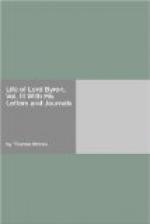of his works. To my certain knowledge, the profits
of the Satire were left entirely to the publisher
of it. The gift of the copyright of Childe
Harold’s Pilgrimage I have already publicly
acknowledged in the dedication of the new edition of
my novels; and I now add my acknowledgment for
that of The Corsair, not only for the profitable
part of it, but for the delicate and delightful
manner of bestowing it while yet unpublished.
With respect to his two other poems, The Giaour
and The Bride of Abydos, Mr. Murray, the publisher
of them, can truly attest that no part of the
sale of them has ever touched his hands, or been disposed
of for his use. Having said thus much as
to facts, I cannot but express my surprise that
it should ever be deemed a matter of reproach
that he should appropriate the pecuniary returns of
his works. Neither rank nor fortune seems
to me to place any man above this; for what difference
does it make in honour and noble feelings, whether
a copyright be bestowed, or its value employed, in
beneficent purposes? I differ with my Lord Byron
on this subject as well as some others; and he
has constantly, both by word and action, shown
his aversion to receiving money for his productions.”
* * * * *
LETTER. 163. TO MR. MOORE.
“February 26. 1814.
“Dallas had, perhaps, have better kept silence;—but that was his concern, and, as his facts are correct, and his motive not dishonourable to himself, I wished him well through it. As for his interpretations of the lines, he and any one else may interpret them as they please. I have and shall adhere to my taciturnity, unless something very particular occurs to render this impossible. Do not you say a word. If any one is to speak, it is the person principally concerned. The most amusing thing is, that every one (to me) attributes the abuse to the man they personally most dislike!—some say C * * r, some C * * e, others F * * d, &c. &c. &c. I do not know, and have no clue but conjecture. If discovered, and he turns out a hireling, he must be left to his wages; if a cavalier, he must ‘wink, and hold out his iron.’
“I had some thoughts of putting the question to C * * r, but H., who, I am sure, would not dissuade me if it were right, advised me by all means not;—’that I had no right to take it upon suspicion,’ &c. &c. Whether H. is correct I am not aware, but he believes himself so, and says there can be but one opinion on that subject. This I am, at least, sure of, that he would never prevent me from doing what he deemed the duty of a preux chevalier. In such cases—at least, in this country—we must act according to usages. In considering this instance, I dismiss my own personal feelings. Any man will and must fight, when necessary,—even without a motive. Here, I should take it up really without much resentment; for, unless a woman one likes




